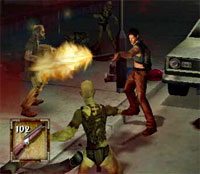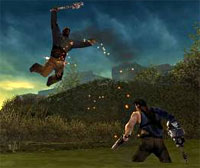 The New Scientist is reporting that US researchers have discovered a brain mechanism that may link violent computer games with aggression.
The New Scientist is reporting that US researchers have discovered a brain mechanism that may link violent computer games with aggression.
Although not conclusive, the study suggests a causal link between virtual and real world aggression.
Previous studies have concluded that violent video game players are “more aggressive, more likely to commit violent crimes, and less likely to help others”, but critics argue that this just shows that violent people gravitate towards violent games, so the games aren’t responsible for turning little Timmy into Ivan the Terrible.
A team led by Psychologist Bruce Bartholow from the University of Missouri-Columbia discovered that fraggers show diminished brain responses to images of real-life violence, such as gun attacks, but not to other emotionally disturbing pictures, such as those of dead animals, or sick children.
 Bartholow argues that this reduction in response is correlated with aggressive behaviour.
Bartholow argues that this reduction in response is correlated with aggressive behaviour.
Employing technology so advanced that mere mortals wouldn’t even know how to plug it in, the team measured a brain activity called the P300 response, which is the characteristic signal seen in an EEG (electroencephalogram) recording of brain waves as we see an image (like us, you already knew that, didn’t you?)
This P300 response whats-it reflects an evaluation of the emotional content of an image, so the bigger the response, the more people are surprised or disturbed by an image. Novel scenes also register a big response.
 The team shipped in a crew of 39 gamers, and quizzed them on the amount of violent games they played, before being shown a series of neutral images interspersed with occasional violent or negative (but non-violent) scenes, while sensors recorded their EEGs.
The team shipped in a crew of 39 gamers, and quizzed them on the amount of violent games they played, before being shown a series of neutral images interspersed with occasional violent or negative (but non-violent) scenes, while sensors recorded their EEGs.
The full-on fraggers with the most experience of violent games were then found to register a smaller and delayed P300 response to the violent images.
“People who play a lot of violent video games didn’t see them as much different from neutral,” says Bartholow, with the research finding that although desensitised to such scenes, their responses were still normal for the non-violent negative scenes.
Although this may not exactly be big news – video games have been used to desensitise soldiers to scenes of war – players with the greatest reduction in P300 brain responses were found to dish out the severest “punishments” against fake opponents in another game.
 Throughout the tests, the violent games experience and P300 response were still strongly correlated with aggressiveness.
Throughout the tests, the violent games experience and P300 response were still strongly correlated with aggressiveness.
“As far as I’m aware, this is the first study to show that exposure to violent games has effects on the brain that predict aggressive behaviour,” says Bartholow.
Not everyone is convinced though, with Jonathan Freedman, a psychologist from the University of Toronto commenting, “We habituate to any kind of stimulus. All we are really getting is desensitisation to images. There’s no way to show that this relates to real-life aggression.”
 Freeman also added that stopping people playing violent video games would be like banning them from playing sports such as football or hockey.
Freeman also added that stopping people playing violent video games would be like banning them from playing sports such as football or hockey.
The work will appear early in 2006 in the Journal of Experimental Social Psychology.